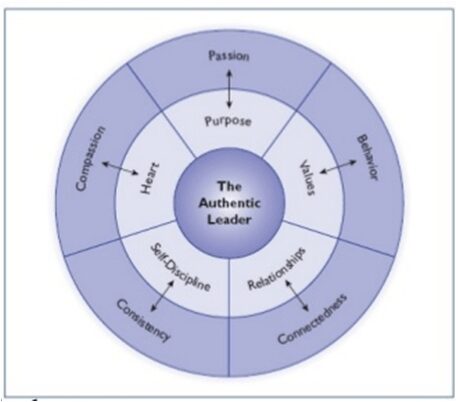Simon Sinek famously said that leadership is a choice, it has nothing to do with your position or your rank, if you decide to look after the person beside you, you are a leader. Helping people to the right or the left of you is how we change the world.
Leadership is fundamentally about facilitating high performance and helping people to be the best that they can be. Emotional intelligence is a key attribute that helps leaders achieve this function.
Authenticity is about openly and effectively expressing oneself, honouring commitments and encouraging this behaviour in others. It’s about doing what you say you are going to do and being who you say you are.
Why is authentic leadership important?
Authenticity in the workplace is the single strongest predictor of an employee’s job satisfaction, engagement, commitment, and workplace happiness.
Authentic leadership is a management style in which leaders are genuine, self-aware, present and transparent. An authentic leader is able to inspire loyalty and trust in employees by consistently honouring commitments and keeping promises. When you keep your word in both the big and small things, you develop a strong reputation for reliability and trustworthiness. Therefore, authentic leadership leads to higher levels of trust within the organisation, greater productivity and a more positive working environment.
What does an authentic leader look like?
- They have a high level of self-awareness and have not lost sight of where they come from or who they are, regardless of the role that they have or the organisation that they work for. As I have talked about previously, this is a foundational emotional intelligence competency
- They recognize their people’s contribution and actively encourage others to be heard and communicate their thoughts, feelings and opinions
- They have high levels of self-discipline which gives them focus and determination together with the ability to set and work towards specific goals, regardless of setbacks along the way
- They create a sense of common purpose – a commitment to the company mission and values and understand how they align to the business goals. This sense of collective purpose drives employee engagement and commitment
- They seek feedback from, and learn from their people and respond effectively when challenged
- They are lifelong learners and continuously look for opportunities to advance and improve
- They express their thoughts and feelings in a way that is sensitive to others and their individual perspectives and needs
- They connect and are forward thinking, seeing the bigger picture as well as the world from others’ perspectives
This model by Bill George, focuses on the different qualities an authentic leader has or can develop.

Purpose and passion, values and behaviour, relationships and connectedness, self-discipline and consistency, and heart and compassion. According to George:
- Authentic leaders have a sense of purpose, they have a high level of self-awareness and awareness of others and they know what they want to achieve and by when. Purpose can manifest itself as passion. Passionate people are engaging, highly motivated, driven, persuasive and care about the work they are doing.
- Authentic leaders are genuine and have strong values which they do not compromise on. This quality manifests itself through the leader’s behaviour, authentic leaders always act in accordance with their values. An authentic leader lives and breathes their values and those of the organisation and encourages the same behaviour in the people that they lead.
- Authentic leaders build solid, valuable and long-lasting relationships with those people that they lead and the people that they connect with. These strong relationships lead to a strong sense of connectedness.
- Authentic leaders are self-disciplined which gives them direction, focus, determination and persistence. Self-discipline leads to consistency which is needed to effectively lead teams, particularly during times of uncertainty and upheaval.
- Authentic leaders have heart, which shows in their compassion. They are sensitive to others’ needs and are willing to help them. Another trait that is of particular importance in the current environment.
Ultimately, authenticity is a leadership skill that can be developed (or weakened) over time, depending on your conscious efforts. To ensure you’re able to lead your team and have a positive, significant and long lasting impact on them and to engage, motivate and inspire them, authenticity and authentic leadership is the key.

